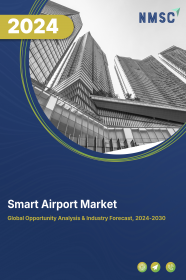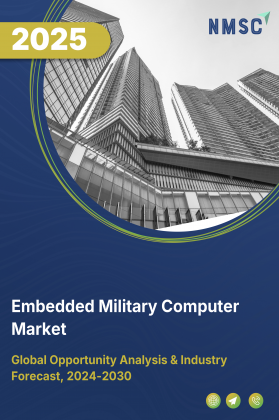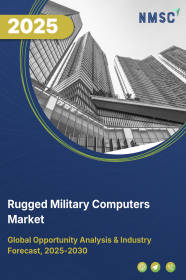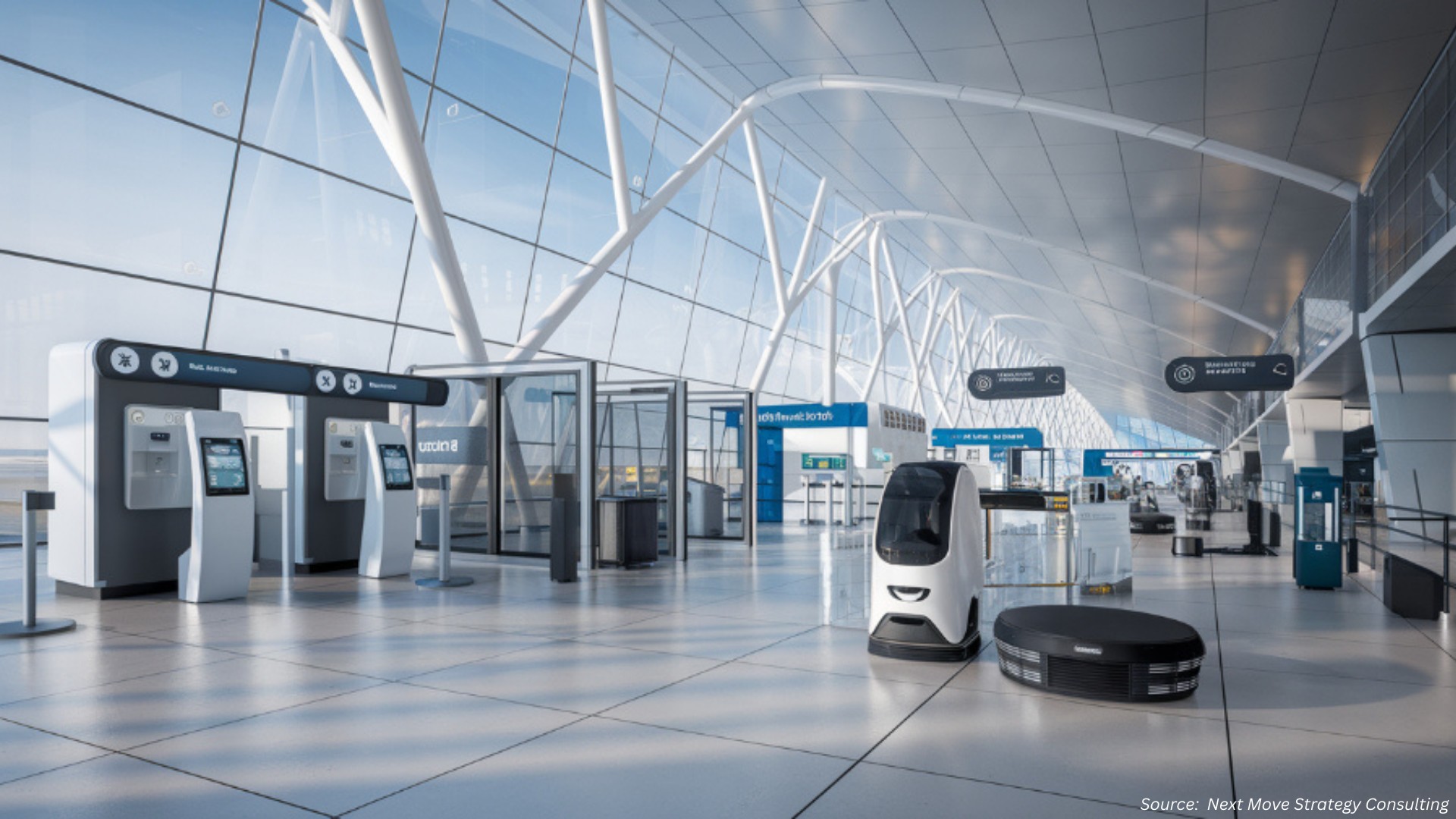
Smart Airport Market by Type (Airport 2.0, Airport 3.0, and Airport 4.0), by Platform (Software Systems and Hardware Systems), by Airport Size (Small, Medium, and Large), by System (Communication Systems, Data Storage, Endpoint Devices, and Others), by Application (Airside, Terminal Side, Landside), and by Operation (Aeronautical Operations and Non-Aeronautical Operations)- Global Opportunity Analysis and Industry Forecast 2024-2030
Market Definition
The Smart Airport Market was valued at USD 6.32 billion in 2021 and is predicted to reach USD 14.91 billion by 2030, registering a CAGR of 13.1% from 2024 to 2030.
A smart airport refers to an airport that provides advanced solutions to improve the capacity and systems such as checking, security, communication, and luggage control among other solutions within a minimal time frame. These airports rely on the application of connected technologies such as sensors, GPS, and IoT devices in the operations, planning, and tasks digitally to support the flow of activities for passengers and staff across the airport. These technologies comprise automated, agile, scalable, responsive, and holistic solutions to meet transport operations. In addition, smart airports constitute functionalities including automated gates, digital wayfinding, automation of immigration process, luggage scanning and weighing, remote tools, and equipment monitoring among others.
Market Dynamics and Trends
The growing demand for advancements in commercial aviation as well as an increase in the need for real-time information through SMS services and check-ins via self-service kiosks are driving the market growth of smart airports. Also, the incorporation of intelligent technologies such as IoTs and sensors in airports that allows the use of renewable as well as eco-friendly sources such as on-site energy generation from solar, wind, biomass, and hydrogen sources to reduce pollution and achieve sustainable goals is fueling the growth of the market.
Moreover, technological advancements such as smart glasses for visually impaired passengers to help them navigate every step of the airport and the introduction of biometrics for passengers are further propelling the growth of the market. For instance, in October 2021, Kansai Airport collaborated with Secom to deploy two security robots at Terminal 2 of Kansai International Airport (KIX) and Kansai Airport Station. These robots were developed to autonomously navigate and patrol routes using a laser sensor that will allow them to identify the location. The robots are integrated with 360-degree cameras, bumper sensors, ultrasonic sensors, warning functions, warning lamps, and warning voice functionality.
The high cost involved in the development, design, and implementation of digitalized technologies in smart airports along with the lack of skilled workforce for operating the advanced systems are major factors that are expected to restrain the smart airport market growth. On the contrary, AI chatbots have replaced customer services widely to respond to inquiries and requests efficiently along with cloud computing that provides a contactless airport experience. This is expected to create lucrative growth opportunities for the market players in the upcoming years.
Market Segmentation and Scope of Study
The global smart airport market is segmented based on type, platform, airport size, technology, application, operation, and geography. Based on type, the market is classified into Airport 2.0, Airport 3.0, and Airport 4.0. On the basis of platform, the market is categorized into software systems and hardware systems. Based on airport size, the market is divided into small, medium, and large. On the basis of system, the market is segmented into communication systems, data storage, endpoint devices, and others. On the basis of application, the market is segmented into airside, terminal side and landside. Airside segment is further sub-divided into air traffic management, aircraft parking, resource management, aircraft maintenance, and others. Terminal segment is sub categorized into check-in systems, baggage handling, building operations, and sustainable energy management. Landside is further sub-divided into security, vehicular parking, and intelligent advertising. On the basis of operation, the market is divided into aeronautical operations and non-aeronautical operations. Geographical breakdown and analysis of each of the aforesaid classification includes regions comprising North America, Europe, Asia-Pacific, and RoW.
Geographical Analysis
North America dominated the global smart airport market in 2021 and is expected to remain dominant in the market throughout the forecast period. This is attributed to the factors such as high investments by the governments in the modernization of airports within the region. For instance, in July 2022, the U.S. Department of Transportation’s Federal Aviation Administration (FAA) announced an investment of USD 1 billion in 85 airports across the country to expand capacity at airport terminals, increase energy efficiency, and provide greater accessibility for individuals with disabilities.
Also, the presence of global brands in the airport optimization industries such as IBM, SITA, and Cisco Systems Inc. as well as the presence of the biggest international airport — Hartsfield-Jackson Atlanta International Airport (ALT) are significant factors driving the market growth in this region.
Asia Pacific is projected to exhibit substantial growth in the global smart airport market during the forecast period, due to an increase in air traffic in countries such as China, Japan, Singapore, and India coupled with passengers’ preference for air transport due to fast and comfortable travel experiences. Also, government initiatives for implementing advanced solutions at airports in developing economies such as China, Japan, and South Korea as well as the construction of new airports and expansion of existing airports in this region are fueling the market growth.
For instance, in June 2022, the South Korean Ministry of Land, Infrastructure and Transport announced to invest over 624 million USD in the construction of a local airport in Saemangeum, Seoul. The new airport was planned to comprise 2,500-metre runways, a passenger terminal, and a cargo terminal with an airport apron that can accommodate five planes.
Competitive Landscape
The smart airport market includes several market players such as ITA, Collins Aerospace, Siemens AG, Honeywell International Inc., Raytheon Technologies Corporation, Wipro Limited, Huawei Technologies Co., IBM, Daifuku Co., Ltd. and Amadeus IT Group SA among others. These market players are adopting various partnerships and collaboration strategies to maintain their dominance in the global smart airport market.
For Instance, in August 2021, SITA announced its collaboration with Siemens for providing the Kansas City Aviation Department with future-proof and scalable technologies for its new Terminal project. These new solutions are aimed at supporting the development of a smart airport terminal that can evolve with the aviation department’s long-term needs, which will enhance the passenger’s experience through automation.
Moreover, in July 2021, IBM announced its 10-year partnership with Bangalore International Airport Limited (BIAL) to create a new ‘Airport in a Box’ platform at Kempegowda International Airport where IBM planned to supply IT solutions that will power a transformation of the end-to-end travel experience for passengers.
KEY BENEFITS
-
The smart airport market report provides a quantitative analysis of the current market and estimations through 2022-2030 that assists in identifying the prevailing market opportunities to capitalize on.
-
The study comprises a deep dive analysis of the smart airport market trend including the current and future trends for depicting the prevalent investment pockets in the market.
-
The information related to key drivers, restraints, and opportunities and their impact on the smart airport market is provided in the report.
-
The competitive analysis of the market players along with their market share in the smart airport market
-
The SWOT analysis and Porter’s Five Forces model are elaborated in the study.
-
Value chain analysis in the market study provides a clear picture of the stakeholders’ roles.
Key Market Segements
By Type
-
Airport 2.0
-
Airport 3.0
-
Airport 4.0
By Platform
-
Software Systems
-
Hardware Systems
By Airport Size
-
Small
-
Medium
-
Large
By System
-
Communication Systems
-
Data Storage
-
Endpoint Devices
-
Others
By Application
-
Airside
-
Air Traffic Management
-
Aircraft Parking
-
Resource Management
-
Aircraft Maintenance
-
Others
-
-
Terminal Side
-
Check-in Systems
-
Baggage Handling
-
Building Operations
-
Sustainable Energy Management
-
-
Landside
-
Security
-
Vehicular Parking
-
Intelligent Advertising
-
By Operation
-
Aeronautical
-
Non- Aeronautical
By Geography
-
North America
-
U.S.
-
Canada
-
Mexico
-
-
Europe
-
UK
-
Germany
-
France
-
Italy
-
Spain
-
Rest of Europe
-
-
Asia-Pacific
-
China
-
India
-
Japan
-
South Korea
-
Australia
-
Rest of Asia-Pacific
-
-
RoW
-
UAE
-
Saudi Arabia
-
South Africa
-
Brazil
-
Remaining countries
-
Key Players
-
ITA
-
Collins Aerospace
-
Siemens AG
-
Honeywell International Inc.
-
Raytheon Technologies Corporation
-
Wipro Limited
-
Huawei Technologies Co.
-
IBM
-
Daifuku Co., Ltd.
-
Amadeus IT Group SA




















 Speak to Our Analyst
Speak to Our Analyst

























